November 30, 2021
The University of the Fraser Valley has digitized 1946 of the Abbotsford, Sumas and Matsqui News. Users can now search or browse from 1922 through to 1946 to discover the history of the communities of the Fraser Valley.
The digitization of Abbotsford, Sumas and Matsqui News was digitized with support from the Irving K. Barber Learning Centre through its BC History Digitization Program and is available via Arca.
For more information about the 2021/2022 BC History Digitization Program Projects, click here.
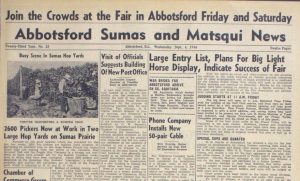
Abbotsford, Sumas, Matsqui Newspaper, September 4, 1946
Read More | No Comments
October 21, 2021
UBC Library’s Small Business Accelerator (SBA) is revving up in celebration of Small Business Month 2021! Now is the chance to expand your entrepreneurial mindset and, thanks to the SBA, do so in a way that suits you best! To get the lowdown on the latest, greatest small business-related book titles and authors, check out the curated displays at David Lam Management Research Library and Irving K. Barber Learning Centre running from Oct. 21 to Nov. 12, 2021. The offerings continue online, where you will find more recommendations not just for books but podcasts, webinars and videos as well. Feel free to discover, while on campus or virtually, just how small businesses, particularly in Canada, are fostering inclusion, driving the green economy and rebounding from the pandemic, among other trends. To access these resources, head to https://sba.ubc.ca/blog and here’s hoping you enjoy a prosperous Small Business Month everyone!
The Small Business Accelerator is a library-led initiative of the Irving K. Barber Learning Centre at the University of British Columbia (UBC). We develop and curate freely available tools structure your market research, grow your business, gauge potential market size or learn the latest industry trends. Managed by specialized librarians, the Small Business Accelerator (SBA) provides free access to reliable resources to help you build a successful business.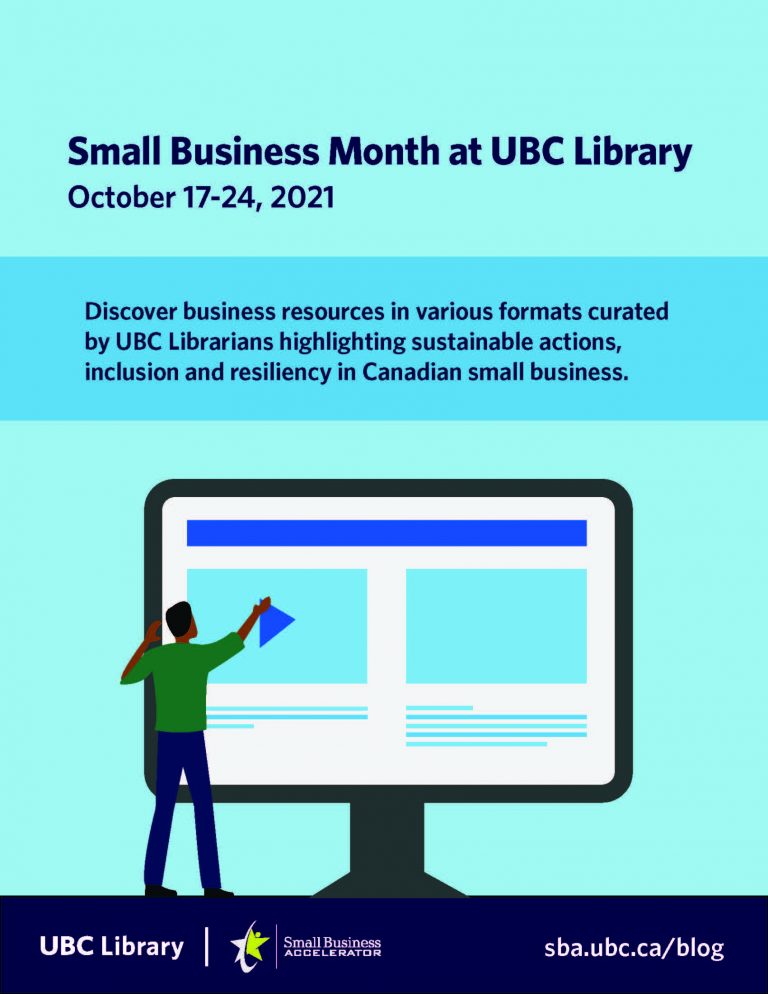
Read More | No Comments
October 4, 2021
The British Columbia History Digitization Program (BCHDP) is now accepting applications for project funding. The program, initiated by the Irving K. Barber Learning Centre in 2006, provides matching funds to support digitization projects that make unique British Columbia content freely available. Since its inception in 2006, the BCHDP has awarded more than $2 million of matching funds for more than 250 projects.
In 2021, the program awarded more than $160,000 for 18 projects. The wealth and diversity of unique British Columbia content to be digitized is impressive. The BCHDP will be accepting applications for the 2022/2023 funding year. Applicants can receive up to $15,000 of matching funds for their projects. Multi-year projects are accepted with each successive year going through the adjudication process.
Applications are due by Friday, December 10, 2021 @ 5:00 pm PST. Information about the application process as well as the guidelines and application form are available on the BCHDP website (https://ikblc.ubc.ca/initiatives/bcdigitinfo/bchdp-applicant-information/). It is highly recommended that applicants consult the Guidelines and Instructions as well as accessing the Application Form because both are updated annually based on feedback from applicants and the program adjudicators.
For more information about the program and to view past projects, please visit the BC History Digitization Program website (https://ikblc.ubc.ca/initiatives/bcdigitinfo/).
Read More | No Comments
August 31, 2021
The University of Victoria Libraries has digitized a total of 84 analogue films and 130 accompanying photographs, textual documents, artwork and related ephemera to promote access to British Columbia artist Karl Spreitz’s extensive film and photography archive.
Karl Spreitz was a documentary and experimental filmmaker, graphic artist, photographer and photo journalist. Through is film and photography, Spreitz captured many important moments in B.C. history almost exclusively on the history, geography, and cultural life of B.C. and its artists.
The digitization of “Coming about”: The films of Karl Spreitz was digitized with support from the Irving K. Barber Learning Centre through its BC History Digitization Program.
For more information about the 2020/2021 BC History Digitization Program Projects, click here.
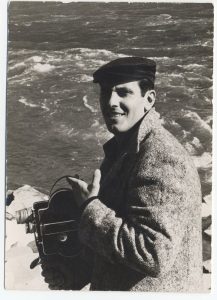
Karl Spreitz holding video camera on a rocky shore [photograph]. University of Victoria Libraries. Victoria, British Columbia. https://vault.library.uvic.ca/concern/generic_works/b8f27a08-fea7-4505-80ee-5060baa9210f
Read More | No Comments
August 12, 2021
The Arrow Lakes Historical Society (ALHS) has completed its digitization of the Valley Voice Digitization Project. The project digitized the first 12.5 years of the newspaper. The Valley Voice is a biweekly regional community newspaper that covers current affairs and promotes local events and businesses in the Slocan, Arrow Lakes and North Kootenay Lake Valleys.
The Valley Voice Digitization Project was digitized with support from the Irving K. Barber Learning Centre through its BC History Digitization Program and is hosted on the ALHS section on the British Columbia Regional Digitized History site and in Arca‘s newspaper collections.
For more information about the 2020/2021 BC History Digitization Program Projects, click here.
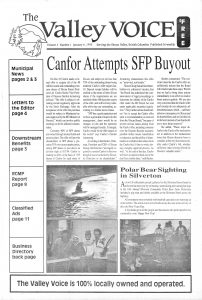
The Valley Voice, January 6, 1995
Read More | No Comments
August 10, 2021
The University of British Columbia Okanagan Campus Library has completed its digitization of 5,386 issues of the Kelowna Courier and 954 issues of the Penticton Herald. The newspapers cover a breadth of topics including social, political and economic matters.
The digitization of Okanagan Newspaper Digitization: Kelowna Courier (1950-1972) & Penticton Herald (1954-1959) was digitized with support from the Irving K. Barber Learning Centre through its BC History Digitization Program.
For more information about the 2020/2021 BC History Digitization Program Projects, click here.
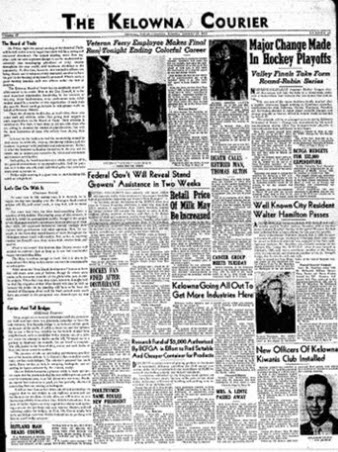
The Kelowna Courier, January 22, 1951. https://bcrdh.ca/islandora/object/news%3A138068#page/1/mode/2up
Read More | No Comments
July 22, 2021
The BC Electronic Library Network (BC ELN) and the Irving K. Barber Learning Centre (IKBLC) at the University of British Columbia Library will offer vital support to prospective BC History Digitization Program (BCHDP) grant applicants seeking to bring their unique collections online.
The British Columbia History Digitization Program (BCHDP) is seeking early notice from prospective 2022/2023 grant applicants. This will enable follow-up with applicants eligible for and interested in additional support during the grant application process. Participating organizations will have access to support that has been designed to meet needs identified in the early stages of digitization planning including grant writing assistance, copyright advisory, connections to digitization partners, project management, securing support staff, and rights management.
Early notice will be accepted until September 15, but the earlier notice you provide the more support we can provide. Early notice is not mandatory, but is expected to improve chances of a successful grant application.
For more information, please visit the BCHDP Applicant Information page here.
To read the press release, please click here.
Read More | No Comments
July 12, 2021
The Museum of Vancouver has completed its digitization of the Vancouver Trades and Businesses Digitization Project. The project digitized 1440 artefacts related to Vancouver trades and businesses spanning in date from the late 1800s to the 1980s. The Vancouver trades and business collection documents the socio-economic history of the city of Vancouver and the city’s role in the development of the province.
The Vancouver Trades and Business Digitization Project was digitized with support from the Irving K. Barber Learning Centre through its BC History Digitization Program and is hosted on openMOV.
For more information about the 2020/2021 BC History Digitization Program Projects, click here.
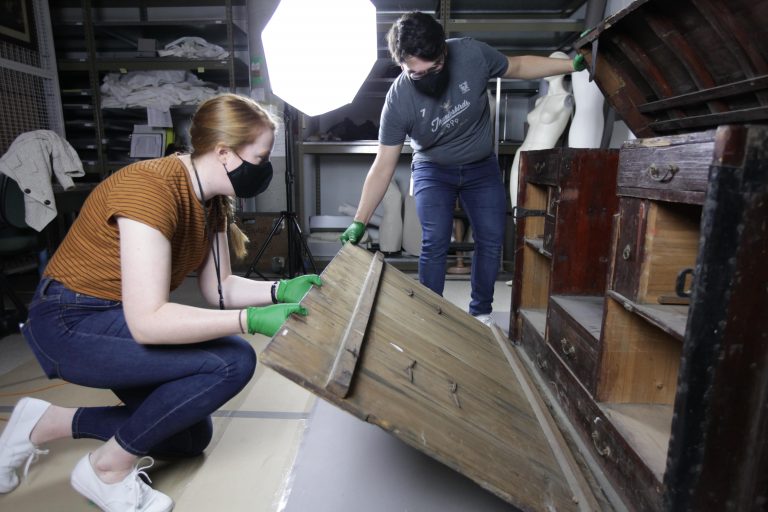
BC History Digitization Project 2020/2021. Museum of Vancouver digitizers.
Read More | No Comments





